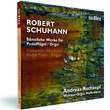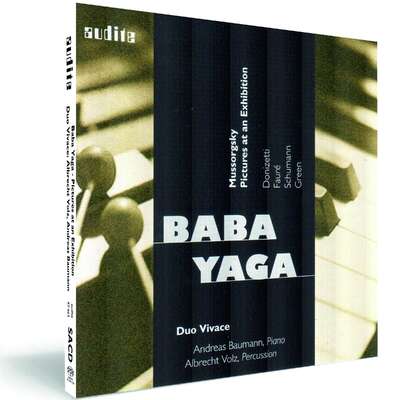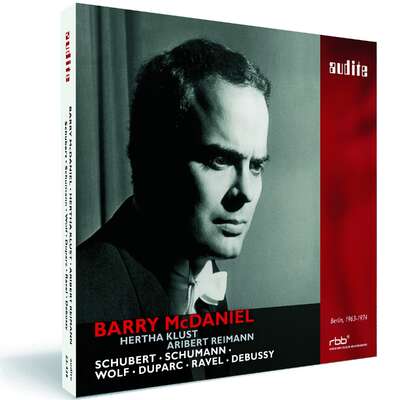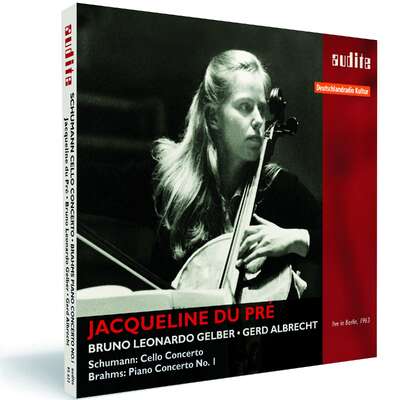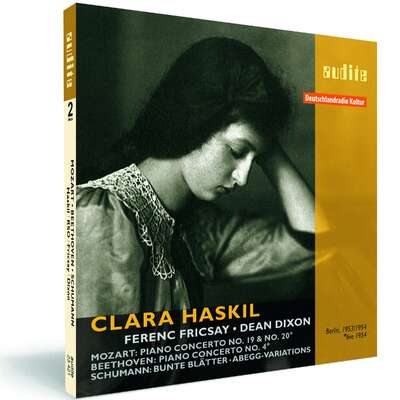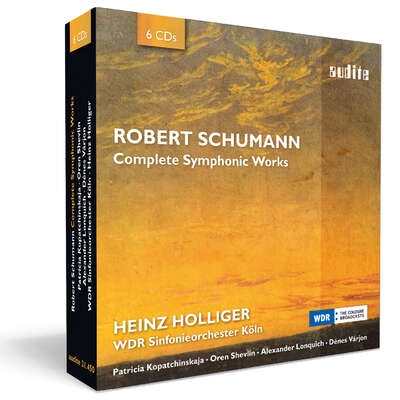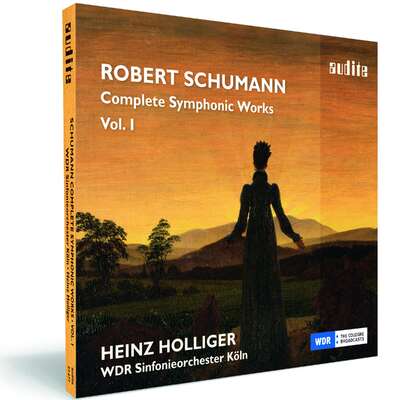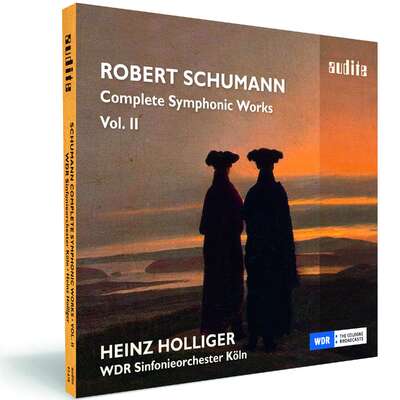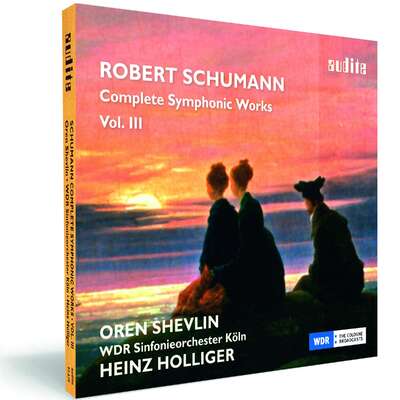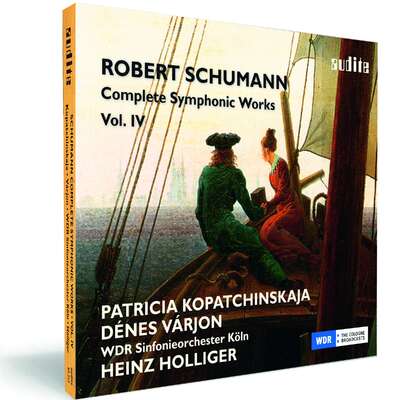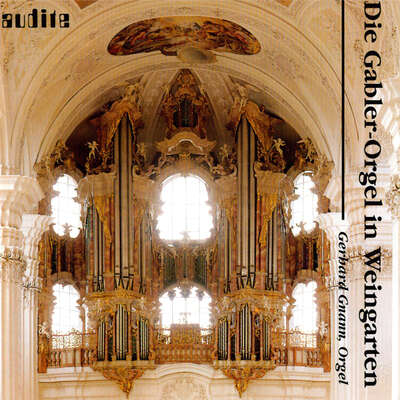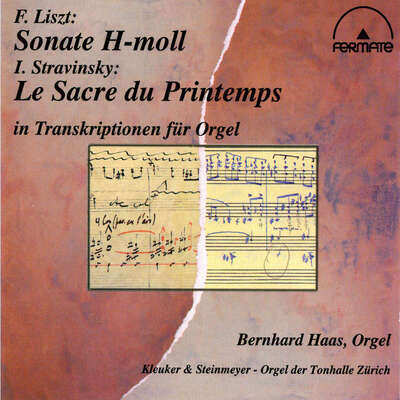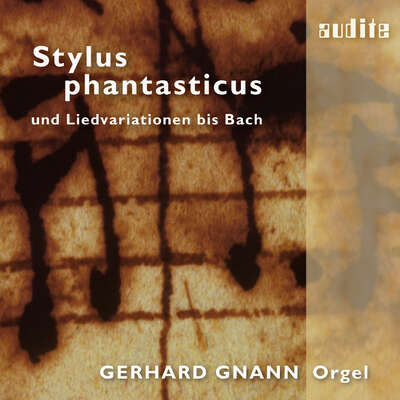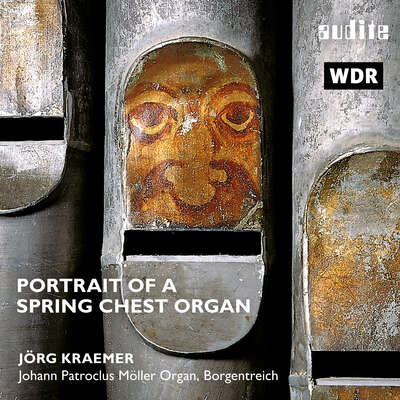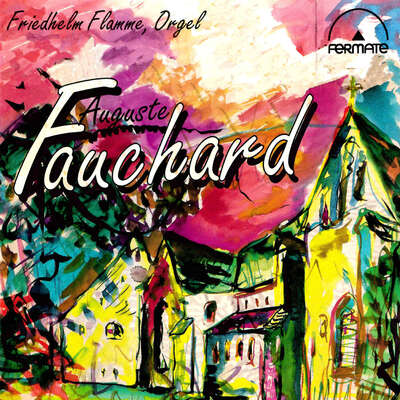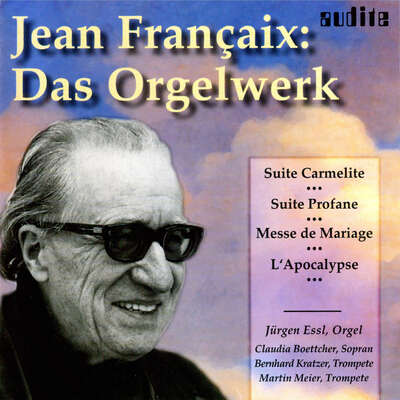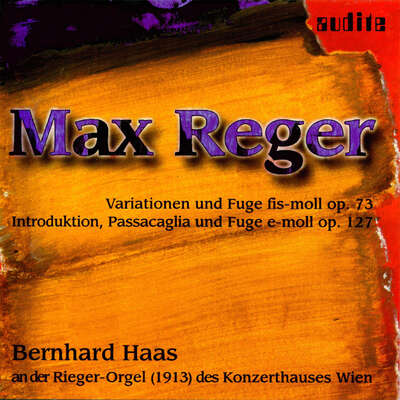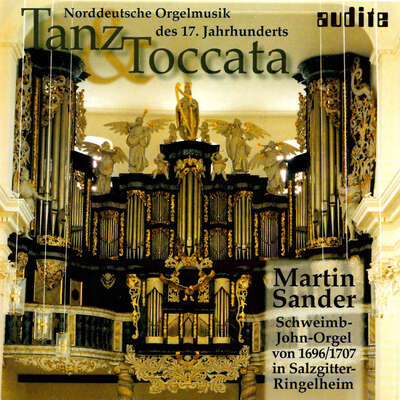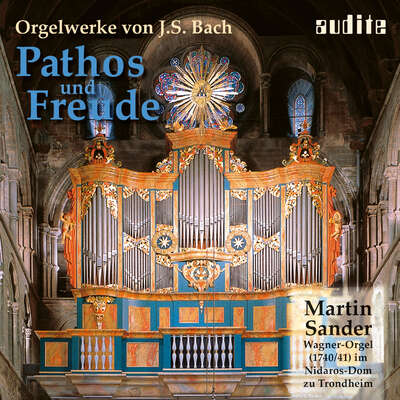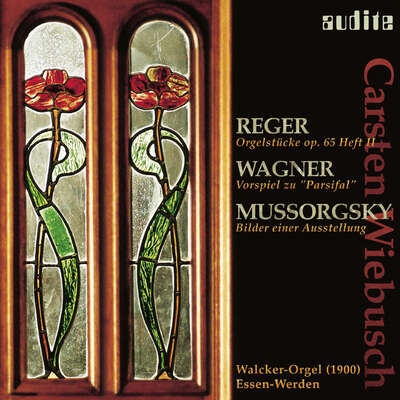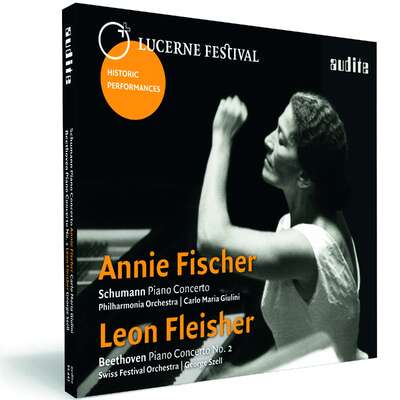
On the occasion of the 200th anniversary of Schumann’s birth audite presents with this re-issue his complete works for pedal piano. “On 24 April [1845] we received a pedal for our piano on hire, which gave us great pleasure. It was primarily intended for practicing organ playing. But Robert...more
"His musical conceptions and superb technique combine with scrupulous attention to details of rhythm and agogic accent (very tricky pieces!), fine choice of registrations, and sensitivity for Schumann's wonderful style, to produce an outstanding recorded document." (American Record Guide)
Details
| Robert Schumann: Complete Works for Pedal Piano/Organ | |
| article number: | 97.411 |
|---|---|
| EAN barcode: | 4022143974112 |
| price group: | BCH |
| release date: | 23. April 2010 |
| total time: | 61 min. |
Informationen
On the occasion of the 200th anniversary of Schumann’s birth audite presents with this re-issue his complete works for pedal piano.
“On 24 April [1845] we received a pedal for our piano on hire, which gave us great pleasure. It was primarily intended for practicing organ playing. But Robert soon developed a greater interest in this instrument and composed some sketches and studies for the pedal piano which will certainly be greeted with enthusiasm as something utterly new”, wrote Clara Schumann in her diary. In May 1845 Schumann finished a first group of works for the pedal piano; he wrote: “To be truthful, I am pretty confident in this instrument and feel that, in time, it might bring new impulses to piano music. Wonderful effects can be made with.” Although this interesting instrumental hybrid was used for example at the Leipzig Conservatory as a practice instrument for organ students, it did not manage to find a permanent place in musical practice.
All works for pedal piano – the „Sketches“ Op. 58, the „Studies“ Op. 56 and the „Six Fugues on the name BACH“ for Organ or Pedal Piano Op. 60 – originate in Schumann’s phase of “fugal passion”, as he himself put it, in 1845. They are characterized by a severe style, which also testifies to Schumann’s profound veneration of Johann Sebastian Bach. On the present CD the works are interpreted on the historic Walcker Organ in Hoffenheim/ Germany.
Andreas Rothkopf studied piano, organ and conducting at the music conservatoires in Saarbrücken, Cologne and Paris. As an organist, he has received many prizes and awards at national and international competitions. Engagements as an organist and pianist as well as invitations to teach and judge have taken him all over Europe, Israel, the Middle East, South America and Japan. Since 1986 Andreas Rothkopf is Professor of Organ at the Hochschule für Musik Saar.
Reviews
Badische Zeitung | Samstag, 16. Juli 2011 | Johannes Adam | July 16, 2011
Musik von Robert Schumann
Romantik aus Baden
Die Werke stammen von 1845, die Orgel, auf der sie eingespielt wurden, von 1846. Dass man die vergriffene Aufnahme von 1987 zum Schumann-Jahr erneutMehr lesen
Diapason | N° 586 décembre 2010 | Paul de Louit | December 1, 2010
Point de spectaculaire nouveauté discographique à l'orgue, en cette fin de bicentenaire Schumann. Audite ressort de ses cartons Andreas Rothkopf,Mehr lesen
Nous n'oserions même parler de phrasé ni de forme à propos du disque de Georges Bessonnet. Cette lecture hésitante (Etude n° 2, Fugue n° 6), aux articulations indécises (Esquisse n° 1), ne s'embarrasse pas de détails : une grosse anche est tirée en plein milieu d'un motif à la fin de l'Esquisse n° 3, dont les octaves de main gauche sont par ailleurs à peine effleurées. Elle ne s'embarrasse pas non plus d'analyse : le rubato, comment dire...expérimental, dans l'Opus 56, semble avoir oublié qu'un canon n'est pas une simple mélodie accompagnée ; l'effet cumulatif de la fin de la Fugue n° 4 est joué comme si Schumann, à court d'inspiration, en était réduit à se répéter sottement ; quant à la rythmique complexe des contre-sujets de la Fugue n° 6, elle est victime d'une apparente inaptitude à juxtaposer deux noires et un triolet. Surprise : la seule pièce à peu près impeccable est la redoutable Fugue n° 5 – Bessonnet aurait-il commis l'erreur de sous-estimer les embûches, moins évidentes, des autres pièces ?
Discographie par conséquent inchangée : mis à part Olivier Latry (BMG) devenu introuvable, restent Bruno Morin (Triton) et depuis peu, pour l'Opus 60, Pierre Farago (Calliope).
Columns - Sound and Music - Novità discografiche | Novembre 2010 | - | November 1, 2010
In occasione del secondo centenario della nascita di Robert Schumann la Audite presenta l’edizione integrale delle opere scritte dal grandeMehr lesen
Organ | 3/10 | Wolfram Adolph | October 1, 2010
„Versäume keine Gelegenheit, dich auf der Orgel zu üben" – dieseMehr lesen
La Tribune de l'Orgue | 62/3 2010 | fc | September 1, 2010
Œuvres complètes de Schumann à Hoffenheim<br /> <br /> 2010 marque le deuxièmeMehr lesen
2010 marque le deuxième
kirchmusik.de | 31. August 2010 um 17:09 Uhr | Rainer Goede | August 31, 2010
Die Neuauflage dieser älteren Einspielung ist dem Schumann-Jahr 2010 zuMehr lesen
Choir & Organ | September/October 2010 | Iain Quinn | August 16, 2010
This disc includes the op.56 and 58 collections for Pedalflügel alongside the six BACH fugues. The first two collections present any number ofMehr lesen
Early Music Review | Number 137 August 2010 | Andrew Benson-Wilson | August 1, 2010
Schumann is perhaps pushing the boundaries of EMR’s normal remit, but his 200th anniversary gives a chance for a peek into the world of romanticMehr lesen
Organists' Review | August 2010 | Michael Bell | August 1, 2010 Andreas Rothkopf plays the historic Walcker organ of the Evangelische Kirche in Hoffenheim, Germany
Twenty three years on, this CD suitably marks Schumann's 200th anniversary. Apart from occasional disconcerting instances of final chords beingMehr lesen
Cumbersome titles too, but many readers will know that Schumann envisaged the fascinating Studies and Sketches as being performed upon a piano (grand or otherwise) with pedalboard. Little is lost by performing them, as here, on organ instead! And the Hoffenheim Walcker certainly gives added value! This particular organ (2m/27st) was built in 1846 – only two years after Schumann produced his music – with cone-valve chests and mechanical action, and was restored by Steinmeyer in 1974. Romantic delights abound. The intriguing specification includes a Physharmonika stop (indubitably fizzy), and a Holzharmonika, which has tapering pipes despite being made of, well ... wood; but such a short list can give no hint of such rich sounds.
Is the star of the show the organ or the composer? Or perhaps the inestimably sensitive and persuasive performer, recorded the year after he became organ professor at Saar Hochschule. Certainly Schumann's complete organ works provide a highly entertaining hour – or happily dip in ad lib. Despite the formal discipline involved, there is much poetry here too. The composer himself felt the BACH fugues might outlive all his other works. The sixth is a mighty tour de force. The Sketches are far from 'sketchy', showing Schumann at his obsessive/neurotic but always compulsive best. A veritable celebratory feast.
WETA fm | Wednesday, 7.28.10, 6:00 am | Jens F. Laurson | July 28, 2010
From the very early days of Audite, back when it was a local German labelMehr lesen
Wochen-Kurier | Mittwoch, 21. Juli 2010 - Nr. 29 | Michael Karrass | July 21, 2010
Zum Schumann-Jahr legt audite mit dieser Wiederveröffentlichung sämtlicheMehr lesen
ouverture Das Klassik-Blog | Freitag, 16. Juli 2010 | July 16, 2010 Schumann: Sämtliche Werke für Pedalflügel / Orgel (Audite)
Immer wieder hat sich Robert Schumann mit dem Werk BachsMehr lesen
www.musicweb-international.com | June 2010 | Gavin Dixon | June 1, 2010
Schumann’s ‘organ’ works are well represented on record. The three almost consecutive opuses make an attractive collection and fit neatly onto aMehr lesen
In the case of opp. 56 and 58, even organ performance is a re-appropriation, as the music was originally composed for pedal piano, a fact rarely acknowledged in CD titles and so all the more creditable for being so described here. That could lead to a potential disappointment for listeners hoping for a taste of this exotic instrument, although the early 19th century Walcker organ on which the music is played is interesting enough in its own right, especially as it is almost contemporaneous with the music.
A recording is available of the two works performed on a pedal piano, the adventurous pianist being Martin Schmeding (ARS 38 011). The comparison is interesting, in that one work, the Op.56 Studies, transfers very well to the organ, while the other, the Op.58 Sketches, relies much more heavily on pianistic textures. The opening of the Op.58 is all staccato chords, never an ideal texture for the organ. Later textures use tremolo effects in the right hand over a melody in the left hand and pedals, again a specifically pianistic texture. On the other hand, Schumann’s dynamics are simple and stepped, allowing the organist to switch between manuals to distinguish answering phrases, for example.
Rothkopf never tries to make the organ sound like a piano. Much of the music is written in long legato lines, for which he can rely on the smoothness of the organ sound and the church resonance, which is always evident on the recording but not to the detriment of the clarity of articulation.
Both the Op.58 Studies and the Six Fugues on the Name BACH, are products of a brief but intense period of Schumann’s life when he became obsessed with the study of strict counterpoint. This makes the instrumentation less relevant, because, as with much of Bach’s keyboard music, the counterpoint plays out in long melodic lines that transfer well between instruments.
Bach is an abiding presence in both works, and not just on account of his name running through the themes of Op.60. The Op.56 studies bear strong stylistic resemblances to much of Bach’s organ music. Many of the themes imitate the ways in which Bach made music playable on the pedal board, such as alternating between a stationary note on one foot and a scale passage on the other.
The idea of fugues based on the BACH cipher seems old hat these days, not least because of the similar works by Liszt and Reger, but in their day they were revolutionary. However, I would have to say that 30 minutes of contrapuntal music based on a single four-note theme can tend towards monotony. True enough, Bach succeeded spectacularly in both The Musical Offering and The Art of Fugue to maintain the interest purely through contrapuntal ingenuity in long monothematic works. It is no discredit to Schumann to say that his skills in this respect don’t quite match up to those of his hero.
The performance of these three works is very fine. As befits what are essentially studies in counterpoint, Andreas Rothkopf never attempts to spice up the textures with unusual or rapidly changing registrations. The recording was made in 1987, some 13 years after the restoration of the 1846 instrument. It sounds in fine condition, excellently tuned and balanced and with no audible tracker noise. In general, it is quite a soft-sounding instrument, all warm, woody tones, which I personally find very attractive.
Good recorded audio too, especially given that it dates from the mid-1980s. The microphones are set quite close, I think, or I assume from the subdued resonance of the church. This is not an SACD by the way, despite what you may read elsewhere on the net, but the recording date alone should make that obvious.
This music isn’t the sexiest that Schumann ever wrote, but it is a valuable contribution to the organ repertoire, not to mention the pedal piano repertoire. This reissue coincides with Schumann’s anniversary year. The record labels have so far done a great job of demonstrating the incredible diversity of his art. He is not really known as an organ composer, and what a shame he did not write more music for the instrument, given the quality of what is on offer here.
